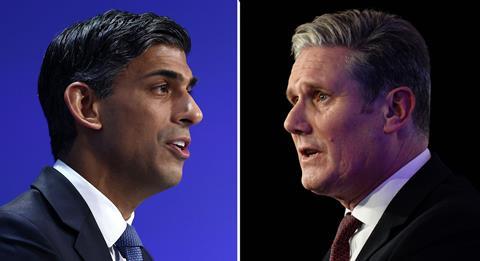In taking stock of the campaign thus far, the Evangelical Alliance’s Danny Webster says all parties need to work harder to engage Christian voters

I’ve been on holiday for two weeks, which given my job revolves around politics, was possibly not the best timing.
But after two weeks in France, enjoying the beach, eating ice-cream, corralling toddlers, I’m attempting to take stock as we approach the mid-point of this election campaign.
I will be going out of my way to try and be as neutral as possible in what follows. Not just because as a public representative of a charity (the Evangelical Alliance) I have a responsibility not to be seen to be promoting one party. But also because our own research shows that evangelicals are spread across the main parties, and the minor ones too, that their policy preferences and priorities vary.
Here are three themes that I’ve noticed as I’ve reflected on the state of the election campaign so far:
The campaign feels both formulaic and unpredictable
The main actors in the parties are doing the things they are supposed to do during an election campaign. I’ve noticed the Liberal Democrats are playing up to it in particular (they know that they need to pull the odd stunt to grab some headlines, so their campaign has basically been a succession of photo-ops of their leader Ed Davey doing slightly amusing things, from falling off a paddle board to going to a theme park and even going down the Slip ‘n’ Slide in Frome.) Meanwhile, the Conservatives know that they need to attract voters back, so they keep packaging up policies which they hope will attract voters to their cause.
However, as formulaic as things have been, the main features of the campaign have been the points of unpredictability. Nigel Farage becoming leader of Reform UK and running for parliament or Rishi Sunak leaving D-Day commemorations early. Who knows what might happen next?
The polls are dictating the politics
The dynamic of the polls predicting a sizable Conservative defeat is dictating the politics, rather than the politics changing the polls.
Things might change, but the conversation most commentators are having is how big will Labour’s majority will be, rather than whether they will win.
That means that the Labour Party are playing it safe. Their manifesto when launched this week is expected to be the slimmest. They are not committing to doing very much – seeking to give them more freedom if they are elected.
The rise and role of Reform UK, together with the way our electoral system works mean that whether or not they win any seats (and predictions suggest if they do it will be in the low single digits) they could cost the Conservatives many. The Liberal Democrats may also be a beneficiary of a large swing away from the Conservatives.
Attempting to work out what polls mean for parliamentary seats has become quite sophisticated science – if you hear someone referencing an MRP poll, resist the temptation to ask what it means because they probably won’t know. Some of the polls during this campaign have gone from predicting a comfortable majority for the Labour Party, to this election being catastrophic for the number of Conservative MPs left in parliament.
While no-one knows quite what will happen, this is dictating the narrative of the election. Increasingly everything the Conservative Party does is seen as evidence of their decline, launching their manifesto at Silverstone prompts metaphors about going round in circles, or the wheels coming off. It also means the Labour Party are receiving significant scrutiny about their policies and what they will do if elected – far more so than any other party. And because of the odd role Nigel Farage and Reform UK play, they get far more attention than a party with just one (former) MP – and that due to a defection – would normally count on.
Matters of faith have not yet entered the political debate
Apparently this week is Labour’s ‘faith week’ in their campaign grid. But unless I had been explicitly told this I wouldn’t have known.
As the person responsible for policy and political engagement for the Evangelical Alliance, I want to know when and how politicians are talking about matters of faith, or issues that are of particular interest to evangelical Christians.
And my summary of the first 20 days of the campaign? Very little.
There’s been some discussion of the impact on Labour’s plan for VAT on private schools and how that will affect small independent Christian schools. There’s a reheated commitment on faith school admissions in the Conservative manifesto, and some slightly confused language about conversion therapy plans – they’ve walked back their previous commitment to legislate, and say they’ll take more time. I’ll be scouring Labour’s manifesto when it’s released for anything of relevance in their commitments.
All policies have a moral dimension
The policy preferences and priorities of evangelicals are diverse and hard to pin down. They certainly do not map neatly onto one party’s policy platform. Many of the issues of most importance to Christians have not yet surfaced in the campaign, leaving many to still be searching for wisdom on how to use their vote. On matters of conscience and ethics the party platforms often do not take a clear approach.
Labour’s faith week was marked by a letter from Sir Keir Starmer to faith leaders, except I don’t think it’s been publicised anywhere, I’ve not come across any related events, and the commitments in it are very vague. That the Labour Party want to build better relationships with faith groups and involve them in the delivery of policy is laudable, but the sentiment seems to be as much about recruiting faith groups into the government’s work and agenda as listening to concerns and places where there could be friction. It’s important politicians do not just thank Christians for their contribution to society but also hear concerns and questions about the direction policies might take.
There’s no single policy commitment that would win over a large block of evangelical Christians. And yet there are significant issues where the engagement of evangelical Christians will be important in the coming parliament. Whether this is around education, freedom of religion, the ethics of the beginning and end of life, the morality of taxation and benefit policy. All policies have a moral dimension, and as Christians part of our role is to work out how to apply what we believe to the complexities of modern day life.
I’m not expecting any of the political parties to provide on a plate a policy platform I’d write for myself, but I do expect them to engage with evangelical Christians beyond the campaign, in local constituencies and in national policy making. So far, we aren’t seeing that.





































No comments yet